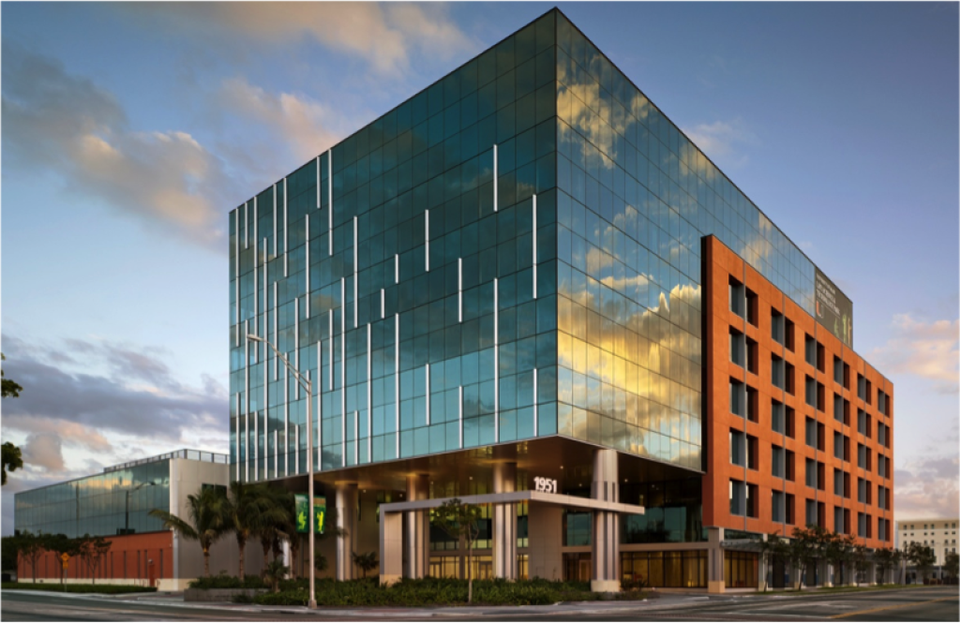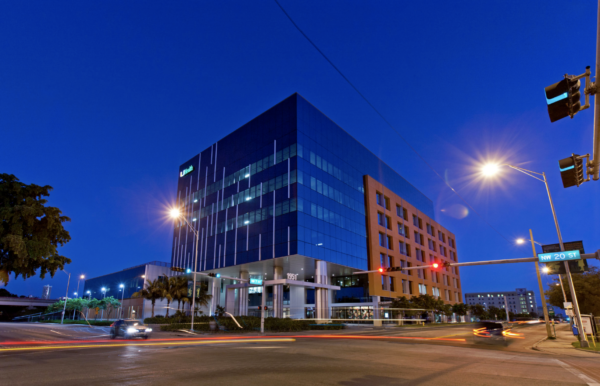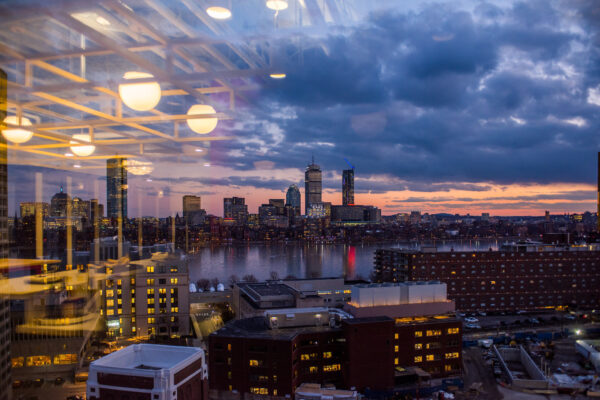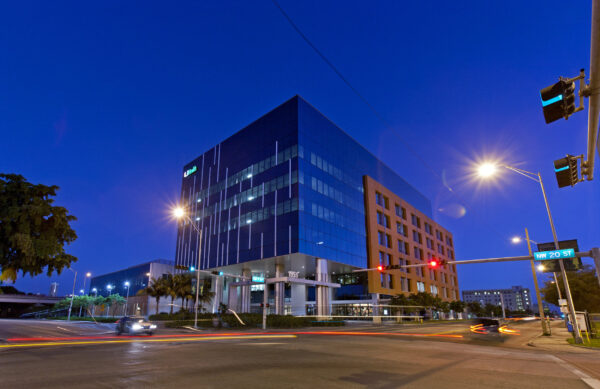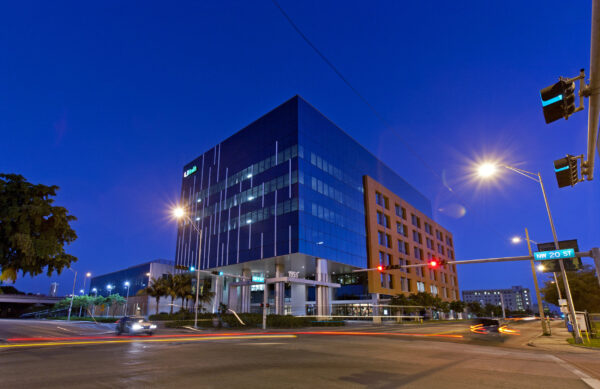The University of Miami Life Science & Technology Park, now rebranded as Converge Miami
A vision of Miami as a technology hub is coming into focus.
The Cambridge Innovation Center is the latest high-profile startup-centric organization to bet big on Miami’s future. The company chose Miami as its second U.S. expansion location, and its center will eventually house more than 500 tech startup companies.
The new center, modeled on its successful spaces in the Boston-Cambridge area that house and support startups, will be in the University of Miami Life Science & Technology Park in Overtown. Organizers aim to open in the fall of 2016; some of the space may open in the spring. Initially it will take up 70,000 square feet in offices, co-working and event space for entrepreneurs, but plans call for an expansion of at least another 50,000 square feet. The CIC team hopes that it will help anchor an innovation district that will serve all of Latin America.
“Miami is the Hong Kong of Latin America. I lived and worked in Hong Kong and it is a place that emerged as the focus point for an entire continent’s business. We think that Miami has that potential. It’s an amazing opportunity,” CIC founder and CEO Tim Rowe said in a phone interview. “We are trying to build the infrastructure in the cities that have the potential to make an impact on the world.”
That’s just what community leaders, including Knight Foundation Miami program director Matt Haggman and eMerge Americas founder Manny Medina, like to hear.
The well-known startup center joins a number of outside players that have begun to place bets on Miami, including the giant WeWork co-working chain, which recently opened a 40,000-square-foot space in Miami Beach and leased the entire 96,575-square-foot Security Building in downtown Miami with plans to open early next year. Silicon Valley’s 500 Startups brought one of its accelerator programs to Miami this fall, and last week Founder Institute announced it is launching startup programs in both Miami-Dade and Broward, joining existing accelerator programs such as Venture Hive. Talks to bring other organizations to the region are ongoing.
All are betting on the future. Miami is still in the early stages of becoming a true center of tech innovation. But numbers of startups are growing rapidly, along with the support system: the Knight Foundation has made 164 investments committing about $16 million in the last three years, funding programs ranging from the weekly “Waffle Wednesdays” to Miami Dade College’s extensive Idea Center. The second annual eMerge Americas conference doubled attendance of its inaugural year, attracting more than 10,000 people as well as international media attention fostered through by its partnership with NBCUniversal.
CIC’s Rowe and Stas Gayshan, managing director, visited Miami periodically for the past two years to study the area. It was an inaugural eMerge event, a hackathon held at the UM Life Science Park that attracted more than 150 techies to develop apps for social good, that helped Gayshan understand Miami’s potential.
“I remember being in that room and thinking this is an interesting slice of Miami that’s here on a weekend, not outside, but getting together thinking about what’s a better way to make the world a better, more interesting place,” said Gayshan, who served as a hackathon judge. For CIC, “That was a defining moment. Miami got it,” Rowe said.
For Rowe, a meeting at The LAB Miami, one of the original Miami entrepreneurial co-working centers, also helped crystallize the vision. “I walked in and thought … this is exactly what I was hoping to see there, the energy, the sense of collaboration that we are growing something together, it’s all there.”
But beyond warm and fuzzy feelings, the life science park and surrounding area needed to meet CIC’s criteria. That included available space for the innovation district’s expansion well beyond CIC to create a district serving all of Latin America. The location needed to be central with links to universities, particularly those involved in the life sciences — that’s provided by the University of Miami’s programs in the life science park and the health district that surrounds it. The CIC would need to be close to an airport — check — and near future modes of public transport, such as the proposed All Aboard station and TriRail hub. The numbers worked, too: Miami had well under 200,000 square feet of existing startup spaces (such as The LAB Miami, WeWork and Venture Hive) while the Boston area had about 700,000.
Haggman, who has led the Knight Foundation’s efforts to support and propel Miami’s entrepreneurship ecosystem, visited CIC’s spaces in Boston and Cambridge over the summer and was impressed with the thriving environments for entrepreneurs. “But what I especially liked is seeing how they are such collaborative, community-focused leaders aiming to help build the broader startup ecosystem, too. Their leadership in not only creating a world-class co-working space, but also in continuing to grow and shape Miami’s young but rapidly evolving startup community, will be invaluable,” he said.
The nine-acre University of Miami Life Science & Technology Park, adjacent to the University of Miami Miller School of Medicine, is owned and operated by Wexford Science + Technology, a BioMed Realty company, and sits on UM-owned land. Wexford was an early adopter of the thesis that Miami could someday be a technology hub, opening the life science park in 2011. With CIC’s long-term lease, the park’s first phase is now 98 percent leased with more than 50 companies, said Bill Hunter, Wexford’s director of leasing.
“We see Miami as a true melting pot of innovation that is at the intersection of technology and the life sciences,” Hunter said. “It’s a big win for Wexford, the UM Life Science & Technology Park, and especially for Miami overall.”
CIC Miami plans to open officially in early fall 2016, with preliminary space becoming available and events commencing in spring/summer of 2016. CIC Miami will launch in Building 1 of the life science park, creating public space on the ground floor, co-working on the third floor and premium flexible office on the sixth floor. CIC will also be launching its nonprofit arm, the Venture Cafe Foundation, to run events and initiatives, collaborate with existing innovation organizations and run a public innovation space. In its other CIC centers, events and programs have typically included youth entrepreneurship programs, education fellowships, pitch events, regular Thursday meetups and a visiting investor program.
St. Louis was CIC’s first expansion outside the Boston area, opening one year ago in 120,000 square feet of space. “We just informed our landlord we need more space,” Rowe said. CIC also recently opened in Rotterdam, The Netherlands.
CIC was founded in 1999 in Kendall Square in Cambridge, Massachusetts, as a place for Rowe and his MIT buddies to work on their startups, but the concept evolved. Rowe calls his model “an innovation concentrator.” CIC spaces are more than shared office space and not an incubator, though they may have incubators inside. Some founding teams move in and stay, growing to dozens or even more than a hundred employees. Today, CIC houses more than 1,000 companies in 500,000 square feet of office and co-working space across its locations. The densest concentration is in Cambridge, with about 750 startups, Rowe said.
“When you create an intense cluster … it creates a beacon effect, as this large collection of companies becomes a destination,” Rowe said. “If you are making it more visible to the rest of the world, then more people will pay attention. That’s important because what you need is investors to come and start hunting there.”
When CIC opened in Cambridge, there was only one small venture fund in the area; now there are 15 funds with $7 billion under management, said Rowe, who is also a venture capitalist. “Miami is awash in cash, but how much is flowing into startups in Miami, creating jobs in Miami? Not much. There is an opportunity to link those resources together.”
High-profile companies started at CIC include marketing automation startup Hubspot, which employs more than 1,100 people and raised $125 million through its initial public offering in October 2014. Greatpoint Energy, a company revolutionizing the global energy industry, was founded at CIC; in 2012 it announced a $1.25 billion deal to build 34 nuclear reactors in China. Android co-founder Rich Miner built his portion of Google Android and established Google’s New England headquarters at CIC; Google now employs 800 people in the neighborhood.
CIC in Cambridge also has been a leader in supporting entrepreneurs in the life sciences and biotech areas. Positioned in the UM life science park, the Miami center has the potential to better connect the startup community with the the healthcare and life science industries.
“This will be a game changer,” said Norma Kenyon, chief innovation officer at the Miller School of Medicine who often works with startups at the life science park and UM’s medical school. “The high-collision environment created among innovators, investors and others will have a positive impact on the ability of the University of Miami and others to bring their ideas and inventions to market.”
